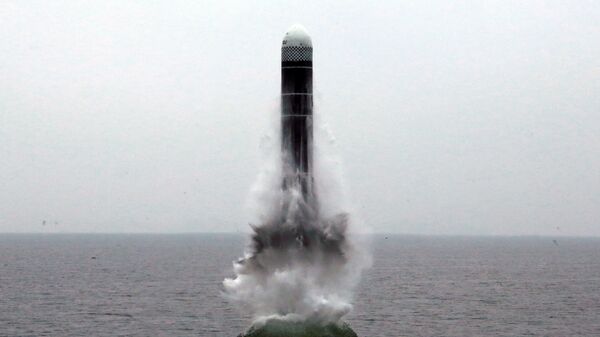Professor of international studies at Ewha Woman's University in Seoul, Leif-Eric Easley, believes that North Korea knows that it has violated the UN resolution banning medium-range missile tests, but wants to “get away with it”.
“Washington will criticise North Korea’s SLBM launch more intensely than recent short-range tests, but not so intensely as to derail upcoming denuclearisation talks. Pyongyang’s timing was likely intended to get away with a test that clearly violates UN Security Council Resolutions without the punishment of increased sanctions”, the scholar said.
US President Donald Trump has, for the most part, played down the DPRK’s latest short-range weapons tests, which have increased in the past months, with the country carrying out 11 missile tests since May, after more than a year of not conducting any launches.
Trump has simply said that North Korean leader Kim Jong-un “likes testing missiles” - but he was referring to short-range missiles. The reason for this is that Trump “tried to avoid antagonising North Korea”, Dr Zhang Baohui, director of the Centre for Asian Pacific Studies at Lingnan University in Hong Kong, explained.
“He [Trump] understands that a deal with North Korea depends on good mutual trust between the two countries. So he has invested political capital to maintain good personal relations with Kim. This motive of Trump also explains why he has refused to react strongly to recent North Korean missile tests. The launch, therefore, will not affect the talks”, Dr Zhang Baohui noted.
But this time, Pyongyang test-fired a new type of a submarine-launched ballistic missile, with North Korea’s Central News Agency (KCNA) hailing the launch:
“The successful new-type SLBM test-firing comes to be of great significance as it ushered in a new phase in containing the outside forces' threat to the DPRK and further bolstering its military muscle for self-defence”, it announced on Thursday.
The KCNA also released photos of the missile, which has been identified by military experts as the Pukguksong-3.
According to South Korea’s military, the missile flew 450 km, reaching an altitude of 910 km.
“It is a step forward for Pyongyang on the technical scale, and most countries who do missile testing aspire to launch missiles at sea because it is strategically a more advanced technology and a sign of advancing offensive capabilities”, said North Korea expert Victor Teo, a professor at the University of Hong Kong.
Professor Teo described the new missile as offensive weaponry. “Being ‘submarine capable’ suggests that the DPRK might have that capability to sail far to the Eastern Pacific to launch missiles at its enemies with little or no warnings”, he said, adding that “if the capability is real, it is a significant threat to the DPRK’s enemies”.
Dr Zhang Baohui, in his turn, pointed out that North Korea has strong reasons to pursue submarine-based missiles.
“Its land-based missiles are vulnerable to pre-emptive attacks by the US. So it is rational for Kim to try to develop sea-based nuclear deterrents. This successful test means they have made genuine progress.”
But at the same time, both experts believe that the DPRK is not capable of completing a “nuclear triad” that includes land-based, submarine-launch and strategic aircraft weapons.
“North Korea will never have a true nuclear triad. It will always lack the air dimension of the triad. So its future nuclear deterrence posture will rely on land- and sea-based capabilities”, Dr Zhang Baohui stressed.
North Korea resumed testing after denuclearisation talks between Trump and Kim failed in February in Vietnam. The North Korean leader hoped to have sanctions lifted, but was not ready to denuclearise.
The two leaders met once again in June in the Korean Demilitarized Zone and agreed to re-start talks on a working level.
According to Professor Teo, Kim Jong-un is trying to get the US attention with the latest missile test:
“Pyongyang, as usual, is sending a message to the United States through this test to pressure the US to pay more attention to DPRK’s needs and wants. It is questionable if this might actually help motivate the Americans in the direction Pyongyang wants, simply because to an extent there is a consensus in the security community in the US that the DPRK is unlikely to denuclearise and remains one of the most significant threats facing the US today”, Mr Teo concluded.

